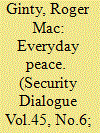| Srl | Item |
| 1 |
ID:
134303


|
|
|
|
|
| Summary/Abstract |
Scholarly work on maritime peacekeeping and responses to maritime insecurity increased notably in the early twenty-first century with much attention turning to Africa's maritime landscape. Africa's offshore security governance became particularly salient as a result of threats to good order at sea as well as how actors in the international system responded. One way of describing the responses to Africa's maritime domain is to view it as part of the response continuum depicting conflict prevention and conflict resolution. Security arrangements at sea depict a growing recognition of the importance of Africa's oceans to the extent that the landward focus of many leaders and security actors has gained a parallel domain – that of maritime security. Thrust upon the wider African security agenda by piracy off East Africa, the importance of the African maritime landscape dawned not only upon the international community and the UN in particular, but the African leadership as well. Threats at sea around Africa have an umbilical connection to what transpires on land and are equally complex to deal with. In a certain way, as suggested in this piece, reactions to promote maritime security governance off eastern Africa have become part of the wider conflict resolution agendas of actors as displayed off the Horn of Africa and in waters of the Southern African Development Community (SADC) further to the south.
|
|
|
|
|
|
|
|
|
|
|
|
|
|
|
|
| 2 |
ID:
136103


|
|
|
|
|
| Summary/Abstract |
This article is a conceptual scoping of the notion and practice of everyday peace, or the methods that individuals and groups use to navigate their way through life in deeply divided societies. It focuses on bottom-up peace and survival strategies. The article locates everyday peace in the wider study of peace and conflict, and constructs a typology of the different types of social practice that constitute everyday peace. While aware of the limitations of the concept and the practice, the article argues that everyday peace can be an important building block of peace formation, especially as formal approaches to peacebuilding and statebuilding are often deficient. An enhanced form of everyday peace (everyday diplomacy) has the potential to go beyond conflict-calming measures to encompass more positive actions linked with conflict transformation. The article can also be read as an exploration of ‘the local’ and ‘agency’ in deeply divided societies. It provides a counterweight to accounts of conflict-affected societies that concentrate on top-down actors, formal institutions and conflict resolution ‘professionals’. The apparent ‘banality’ of the everyday challenges us to think creatively about perspectives and methodologies that can capture it.
|
|
|
|
|
|
|
|
|
|
|
|
|
|
|
|
| 3 |
ID:
135155


|
|
|
|
|
| Summary/Abstract |
Countries afflicted by claims of territorial sovereignty within nation states have been predominantly preoccupied with sharing of administrative and political powers, as in the case of the armed conflict in Sri Lanka. This article argues that fiscal devolution has the potential to empower the regions within contested nation states and thereby contribute to conflict resolution in countries afflicted by internal strife and armed conflict, taking Sri Lanka as a case in point.
|
|
|
|
|
|
|
|
|
|
|
|
|
|
|
|
| 4 |
ID:
135154


|
|
|
|
|
| Summary/Abstract |
Despite long historical ties, post-colonial relations between India and Myanmar have fluctuated between magnanimity and mistrust. While India often stood for high moral grounds and promotion of democracy, it did so at the cost of losing Myanmar to China. This affected both India and Myanmar adversely: while New Delhi’s economic, energy and security interests were hurt, isolated Yangon became more China-dependent. However, since the early 1990s, domestic developments in Myanmar and post-Cold War structural changes in the world order necessitated conditions for cooperation and mutual gains. It appears that blatant domestic suppression in, and international seclusion of, Myanmar is not desirable. Having witnessed two eras of magnanimity and mistrust, Prime Minister Manmohan Singh’s visit to Myanmar in 2012 heralds a prospective era of market interdependence while opening Pandora’s box: can India get a better share of Myanmar’s commercial possibilities without compromising its core interests in promoting democracy, development and diaspora protection?
|
|
|
|
|
|
|
|
|
|
|
|
|
|
|
|
| 5 |
ID:
136671


|
|
|
|
|
| Summary/Abstract |
Development cooperation is an important dimension of international relations, thus has become an integral part of the foreign policy of many countries. Indonesia has always aspired to be a global player, despite of its limitations. As SBY has always shown keen interest in foreign policy, during his tenure, Indonesia embarked on a more serious effort to become an active player in international development cooperation. This arncle discusses the efforts taken by the Government of Indonesia to advance its role in the international development cooperation architecture during the Susilo Bambang Yudhoyono presidency, in particular in the context of development cooperation being carried out as a tool for foreign policy. This article argues that although Indonesia has tended to consider development cooperation as a useful tool of foreign policy, a lot of work is clearly to be done. Development cooperation is not yet closely aligned with the realization of Indonesia’s economic objectives. If a country manages to use development cooperation for both strengthening its soft power (image) and promoting more tangible interests, it can be regarded as pursuing a “smart power” strategy.
|
|
|
|
|
|
|
|
|
|
|
|
|
|
|
|
| 6 |
ID:
134461


|
|
|
|
|
| Summary/Abstract |
This note uses a new data set on international territorial disputes and boundary agreements to explore whether and how legal commitments affect state behavior. Do border treaties reduce subsequent conflict simply through their effect on the distribution of the disputed good, or do treaties have legal and political implications such that a given distribution of territory has different effects depending on whether it is de facto or de jure? There are three main results. First, among states that have homeland territory disputes, the adoption of a legally binding border is associated with a significant reduction in the likelihood of future militarized conflict over the territory. Second, this effect is the same regardless of whether the treaty transfers territory or converts a de facto or contested border into a de jure border without changing the status quo distribution. Third, there is no equivalent reduction in conflict when states create explicitly provisional borders that allow them to retain their claims to areas that they do not possess. These findings suggest that border treaties do more than simply specify the distribution of territory and provide for transfers. By requiring states to renounce claims to territories that they do not receive, treaties generate ex ante costs of signing and/or ex post costs for reneging that explain their association with subsequent peace.
|
|
|
|
|
|
|
|
|
|
|
|
|
|
|
|